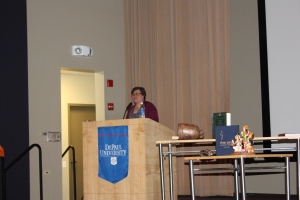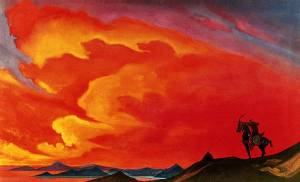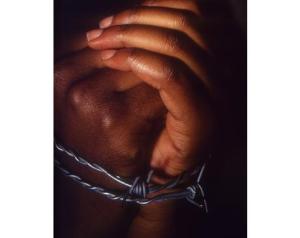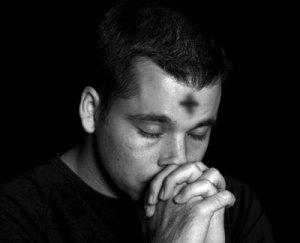Hey Everyone! Here are some snapshots from our most recent Quarterly Interreligious Celebration. Find the full album on DePaul’s Blue For Peace campaign Facebook page (facebook.com/blueforpeace), stay updated on interfaith life at DePaul (depaulinterfaith.org), and keep an eye out for the next Interreligious Celebration in the 2012-13 school year!
Uncategorized
Immersed in Infinite Light & Propelled by a Fiery-Whirlwind
_
Dominique Johnson is a junior at DePaul University pursuing a Religious Studies major. Dominique is on the Executive Board of DePaul Interfaith.
_
“Modern science is our best ally” (Mahatma Letters, No. 11, Chronologically No. 65) and yet “MODERN THOUGHT IS ANCIENT THOUGHT DISTORTED, and no more.” (The Secret Doctrine I, pg. 579)
Paul Brunton once said, “The cosmic order behind things is a divine one…it is creative, intelligent, conscious—it is MIND,” and if so, there is an inner Nature reflected in the inner being of us each, the latter its microcosm; on this (our) earth. The individual atomic lives of men are so inextricably woven; & mankind is a collective unit—i.e., the fact in nature of the universal fellowship of humanity or spiritual oneness of humanity.
What nobler relationship than that of friend? What nobler compliment can man bestow than friendship? The bonds and ties of the life we know break easily, but through eternity one bond remains – the bond of fellowship – the fellowship of atoms, of star dust in its endless flight, of suns and worlds, of gods and men. The clasped hands of comradeship unite in a bond eternal – the fellowship of spirit.” (Manly P. Hall, The Lost Keys Of Freemasonry, 1976, p. 94)
An Alternative View on Human Dignity
_
This article was written by Momena Billah. Momena is a Muslim and an Interfaith Scholar. She is currently a senior at DePaul University, and this is her first year as a Scholar.
_
As globalization and the internet informs and connects us to the lives of human beings across the globe, it may be worthwhile to understand our common denominator, what it means to be human? Philosophies, literature, religions and even Hollywood have delved into this vast task of explicating and demonstrating the state of “humanness.” If our search is for an intrinsic value that a human being possesses regardless of their external religious affiliation, then we need to seek that understanding from within ourselves. To inquire further necessitates the guidance of religion, especially if we are adherents to any of the monotheistic traditions of Judaism, Christianity or Islam.
As a Muslim, it is only natural that I turn to the prime source of explicit Divine Knowledge which is manifest in the Quran. From a Quranic worldview, the human being is the khalifa [ku-leef-a] successor or representative of God on Earth. The evidence for and implications of this title are enormous.
…”Is Anyone There?”
Katie Brick is a Chaplain at DePaul University and is also a faculty director for the Interfaith Scholars program.
_
It’s still true that good news rarely comes in on a land line prior to dawn. I was reminded of that this morning, disoriented in a “what is that noise” sort of way after a couple hard nights with fussy kids.
Cell phone news – now that comes in all shapes and sizes, 24-7, at the whim of the caller for the most part. “They’ll turn off their ringer if they aren’t available” people think – usually true – so text, voice message, the occasional triumphant or embarrassing photo traffic can take place all night without a thought.
But the land line (or in our case, cable line) is basically meant to be on and waiting for urgent calls. Its focus after hours is receiving in the moment news that might be unwelcome, unwanted, or unexpected but which is important to the caller and answerer alike. And this morning, as I stumbled out of bed (because land lines are rarely located conveniently next to one’s bed like a cell phone for reasons of common access and potential heart failure from a blaring light night call), I had a few seconds to gather myself. To process that Something had happened or was happening.
A Prayer to the God of Life
This article was written by Emma CushmanWood, a junior at DePaul. Emma is a former Interfaith Scholar and the current president of DePaul Interfaith.
_
A Prayer to the God of Life*
My father whispers in his low voice to my mother a verse. His hand on her swollen belly. A tiny heartbeat inside. The midwife smoothes her hair and dampens her head with a moist towel. Beads of clear water mixed with sweat run along her tender cheekbones.
Deep calls to deep in the roar of your waterfalls… She groans low as each wave of pain washes over her. Pulsing. Pulsing. The waves are strong and beat against the rocky shore. As each new wave comes, another one follows. My small hand grasps her wet palm. I listen to the deepness of her breath.
…All your waves and breakers have swept over me… Breathe in, breathe out, they tell her. In syncopation, my mother and I breathe a wave of fresh air, in and out. The midwife tugs me away. I watch them. Her body covered in sweat. His arms support her. They lie back against the pillows on the bed as he lets her weight sink into his skin.
Ways of Faith: Encountering Intra-Faith Diversity
_
Caelin Niehoff is a sophomore at DePaul University pursuing a degree in American Studies. Caelin is an Interfaith Scholar and is involved with Catholic Campus Ministry at DePaul.
_
I am a Christian; more specifically, I identify with and practice the Roman Catholic faith tradition. My Catholic “roots” so to speak, came from my grandmother. My grandmother’s experience of Catholicism, however, has been quite different from my own. Growing up in Limerick, Ireland, my grandmother’s encounter with Catholicism was the sight of her strong willed, younger sister receiving physical and verbal punishment from nuns in a classroom. Her experience of Catholicism was the rejection from priests in Perry Square who would not give her mother food. Juxtaposed to this, my grandmother also had positive experiences with the Irish, Catholic Community. Her fondest memories are those of Vincentian priests giving her candy; “they always remembered us children. We were poor, it was all we knew, but they knew we were children all the same”, she would say.
My grandmother’s Catholic history is uniquely different from my own, but I think the important fact is to note this difference. It is my perception and experience that Catholics experience Catholicism and interact with Catholicism in a variety of ways. I, myself, have had a dynamic faith journey as a Catholic that I strongly feel will continue to mold and change overtime.
Theosophy—Tracing a Universal Ancient Tradition
_
Dominique Johnson is a junior at DePaul University pursuing a Religious Studies major. Dominique is on the Executive Board of DePaul Interfaith.
_
Truly til weeks earlier, the writer labored under misconceptions, that the system the writer studies—“Theosophy” is a progressive or evolving system of thought; and that this system claiming to be as ancient as thinking man is synthetical in its method. But it is synthesis itself, essentially a philosophy of consciousness. Theosophy is not a religion, but it is religion [not in the ordinary sense] itself. Many things may not be laid out for the eager student, but each one works to unveil gradually a grand panorama, a shoreless ocean. Together humanity can face calmly towards the boundless sea reflecting the radiant light of the Sun. Integrally there is Order when we manifest It in daily life. Humanity is collectively E pluribus unum, and that unum—Infinite Unity. One cannot help, but become optimistic towards humanity, if one perceives the very guiding Force or will-to-exist is the pure Noumenon of Thought, which is the ideal of a universal, all-pervading, immeasurable Noumenon of Spirit—Self-Existing, absolute Non-Being. Ponder upon it deeply. I hope it is very helpful to our mind. I will explain without much tedious historical analysis, what has roused me to write this blog.
Why I Repeat The Call For Radical Inner Change
_
Dominique Johnson is a junior at DePaul University pursuing a Religious Studies major. Dominique is on the Executive Board of DePaul Interfaith.
_
…if your discretion and silence are likely to hurt or endanger others, then I add:
Speak the truth at all costs, and say, with Annesly, “Consult duty, not events.” There are cases when one is forced to exclaim “Perish discretion, rather than allow it to interfere with duty.”—Key to Theosophy, p. 202.
I would’ve liked to talk about “What is Theosophy” & the Theosophical Society (TS), but I’d rather ponder upon certain questions in relation to theosophy, and forward them as a concern and as a student, rather than firing away all the principles of the Society I am a member of. I will write again about the necessity of the psychological understanding of the Mind§, but as one is reading, find out what is the writer implying by radical transformation, seeing each other as we truly are, and so on. So, the writer asks to keep in mind the following First Object each TS member is in sympathy with:
The Interrupters – A Response
_
This article was written by Emma CushmanWood, a junior at DePaul. Emma is a former Interfaith Scholar and the current president of DePaul Interfaith.
_
The documentary The Interrupters was inspirational. It told the stories of those who call themselves the “Violence Interrupters.” The “Violence Interrupters” consist of men and women who have been involved in youth violence or gangs. These men and women then will work within their communities to combat youth violence and will “interrupt” possible fights.
After watching this film, I had mixed feelings. I felt a sense of hopelessness while at the same time I felt like there could be hope. I felt a sense of hopelessness because it is the same story over and over again—a young man or woman or child is shot and killed. It also mostly focused on the black and Hispanic community. It depicted the violence as a cycle—the father is violent and in a gang and so therefore the children grow up to be violent and join a gang. The cycle never ends. Yet at the same time, it does end.
Embracing the Stillness
This article was written by Peter Dziedzic, a junior at DePaul, who is pursuing a major in Religious Studies and a triple minor. Peter is an Interfaith Scholar and a former co-president of DePaul Interfaith.
_
The several-hour hike up the fertile, sloped ledges of the mountain northeast of Bogotá to reach Laguna de Guatavita bloomed into a personal pilgrimage with each step and breath. Reaching the top of the slope, looking down into the sacred lagoon of the native Muiscas, and pausing for a communal reflection in profound stillness, I felt deeply connected not only to myself and the land, to my group members and the history and pain of Colombia, but to the deep roots that bound me in that moment to all narratives of faith and struggle.
Our service immersion group from DePaul University spent days meeting with displaced communities, absorbing the realities of contrast, and engaging with organizations that work to challenge the dominant societal narratives that have fostered decades of internal strife. The images and voices of those affected by the conflict and those seeking to end it echoed not only with a deep pain and sadness, but also a resounding hope.















